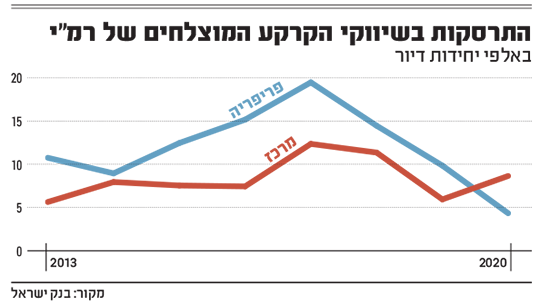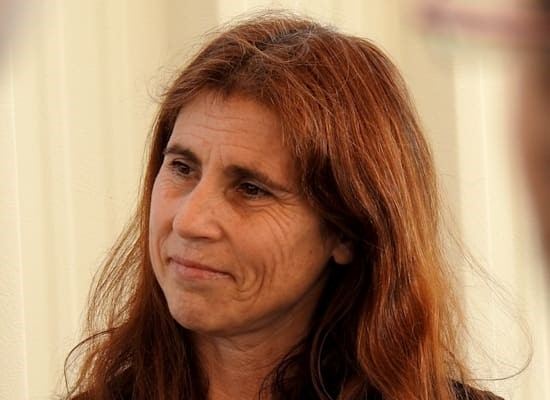Globes, Arik Mirowski, 15.06.2021
After two and a half years of dysfunctional and budget-deficient governments, senior government officials are very troubled by what has been happening in the housing industry recently. Apartment prices are rising sharply, while the labor suppliers of the various bodies in the field are on a steep decline.
"It is important to warn today that the lack of budget, cuts in planning budgets and the employment of consultants, the expiration of the WTMAL Law, and the attempt of some heads of authorities to act against the promotion of housing units in their area, all affect the ability to promote and approve housing units in 2021." Said Dalit Zilber, Director General of the Planning Administration, last week, following the publication of the Planning Administration's report for 2020.
The report shows that the number of housing units approved by the various planning institutions last year was the lowest since 2014, reaching 95.4 thousand housing units, about two-thirds of the number of apartments approved in 2019. The performance of the District Planning and Building Committees, approximately 63.3 thousand, was similar to that of 2014.
Performance is high in the periphery, not in the center
The main reason for the poor outputs is the expiration of the VOTAL a year ago. And in the ultra-Orthodox and Arab sectors, however, the proposal got into controversy and in the end was not promoted anymore and the activities of the VOTAML were frozen.
As a result, the committee's output in terms of approval of housing units was cut by more than half (last year, 32.1 thousand housing units were approved, compared with 65.5 thousand approved in 2019). The committee also announced a particularly small number of complexes as housing favorites (nine compared to 26 in 2018 and 2019), which ultimately ensures that 2021 will not be a good year for the Planning Administration either, at least in terms of quantity.
Another government arm that fails to catch up with its past performance is RMI. This reached a peak in successful land marketing (ie tenders in which there were winners) in 2017, but since then the quantity has fallen sharply. An analysis conducted by the Bank of Israel for RMI marketing revealed that most of the decline was recorded. In the center of the country, in the districts of Tel Aviv, the center and Jerusalem, while in the districts of the periphery - north, south and Haifa, the decline was more moderate.
In both arms - the planning one and the land market one - there is no right proportion between the amount of work done in the periphery, where the demand for apartments is relatively low, but the performance is relatively high, and the center of the country, where the work less meets the demand.

No budget, no marketing, no classrooms, no interchanges
The poor data of 2020 can be partly explained in Corona, but as Zilber said and so do the Ministry of Housing - the lack of budget and a functioning government have affected the functioning of the bodies to a very severe degree.
"We are after five elections, not four, as everyone counts, because there were also local elections in October 2018," says a senior government official in the housing industry. "There is no budget. The paid system of planning, development, marketing of land and accompanying contractors is a system that works on economic fuel, and in recent years the fuel has not been transferred to it, and what is there is not enough: there are no Ministry of Education classrooms. The economy, and infrastructure supporting housing of roads and interchanges, and sewage facilities. Remi could come out with a lot of tenders, but to carry out real marketing you need this envelope. Without governance, without the ability to make decisions and without an approved budget, it is impossible to do all this. "
At a meeting of the Israel Lands Council three months ago, it was clarified that in two plus years in which a stable government with no budget serves, no budgets of NIS 45 billion were transferred for the construction of these infrastructures, which impedes the construction of 58,000 housing units.
Even if a budget is approved in three months as hoped in the coalition formed, it will take time for the system to start gaining momentum, offsetting the recent stalemate.
Ambitious baselines of 300 thousand new apartments
The guidelines of the new coalition state, among other things, that "within 60 days of the formation of the government, the Minister of Construction and Housing will submit to the Israel Land Council a broad and orderly policy decision regarding affordable housing and urban renewal, Urban with attention to social, economic, security and safety issues.
"In addition, the Minister of Housing will bring to the government a marketing plan of 300,000 housing units, including a financial solution for the benefit of all the infrastructure and public institutions required to implement the plan."
The number 300,000 housing units lit a red light for many. Until three years ago, the head of the housing staff, Avigdor Yitzhaki, responded to Globes by saying that "even if they do somersaults in the air, they will not be able to market all the land to the necessary housing units, because there are not enough plans for 300,000 housing units."
There are those in the government who believe that there is only one way to approve such a large number of housing units in a short time, and that is the WTO. Indeed, last week the designated interior minister, Ayelet Shaked, announced that she intends to extend the committee ) For four years with an option for another year.
Among the government bureaucrats, they are even proposing to expand the activities of the VOTAML, and also turn it into a "committee for stuck plans," especially in the center of the country. And in the opinion of government officials, it is time to transfer them to the care of the WTO "The district committees have been given more than enough time to advance the plans. Some of them have been discussed for 15 years, and have not yet been approved. This is a failure of the committees and this is where the WTMAL should come in," says a former senior government official.
Regional Councils: "Damage to Agricultural Land"
The OTMAL, which a year ago was appointed to head Edit Bar, director of the Ministry of the Interior's Development Administration, is a controversial planning tool both in terms of its effectiveness in adding housing units and as a solution to planning problems. In practice, many of the plans are not applicable for the coming years.
 Edith Bar, Chairman of Hotamal / Photo: Lior Mizrahi
Edith Bar, Chairman of Hotamal / Photo: Lior Mizrahi
"In a few years a reverse mortgage will become a popular consumer product"
The Center for Regional Governance, which represents the 54 regional councils in Israel, is leading the fight against VOTAL, among other things against the background of the heavy price its members are paying, in the form of massive expropriation and thawing of agricultural land. And the heads of the regional councils met with the party leaders during the election campaign and demanded that the activities of the VOTAL be curbed, and the party leaders undertook to do so.
Hajjaj does not believe in the decisions to convert the UTMAL mainly to advance plans in the Arab sector and to urban renewal. The UTMAL has completed its role. Thousands of housing units, while it is known that there are hundreds of thousands of approved housing units and less than 15% of them are in the process of marketing and execution. Housing solutions for the Arab sector can be found in other ways, and not through the WTO, he said.
 Shai Hajaj, Chairman of the Regional Government Center / Photo: PR
Shai Hajaj, Chairman of the Regional Government Center / Photo: PR
The Greens: "Planning that is irrelevant to changing needs"
Indeed, it is known among the members of the new coalition that Blue and White and Labor oppose the continued operation of the WTO, but they do not hold any of the positions related to the housing industry (Ministries of Housing, Finance and Interior), so it is hard to believe their opposition will have an effect.
Alongside these, 20 environmental organizations, led by the Society for the Protection of Nature, appealed to the leaders of the new coalition, asking them not to renew the activities of the WTO. "In 2015-2020, more than 720,000 housing units were approved in the planning institutions," they wrote. During these years, about 65,000 housing units were approved as part of building permits under NOP 38. A total of more than 785,000 housing units were approved during these years, but construction began on only 320,000 housing units. That is, at least 465,000 housing units were added to the planning inventory. , Which even before 2015 stood at hundreds of thousands of housing units, was written in a letter they wrote.
 Iris Hahn, CEO of the Society for the Protection of Nature / Photo: Dov Greenblatt
Iris Hahn, CEO of the Society for the Protection of Nature / Photo: Dov Greenblatt
"This inventory is growing almost automatically at the stage of building permits by tens of percent in light of the Shebes and Kahlon regulations, which allow for additional housing units beyond what is approved in the plans. Will be relevant to ever-changing needs. "
However, despite the arguments of the opponents, the WTO has been able to please politicians from most parties, as it produces impressive numbers. Therefore, the chances of the committee being renewed and even greatly strengthened at the expense of the district committees seem reasonable.



